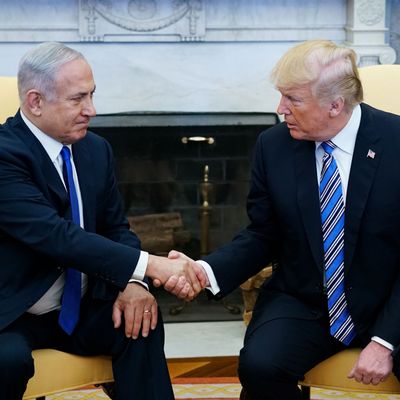
Last week, Donald Trump decided, on a whim, to accept Kim Jong-un’s invitation to come by for some “nuclear talks and chill.” The critical response to the president’s decision has fallen into two (somewhat overlapping) categories:
Trump has no idea what he is doing, a history of being swooned by authoritarian leaders’ attempts at flattery, and few (if any) experts on North Korea among his White House staff.
North Korea’s track record shows that its word cannot be trusted.
Both of these concerns have merit, and constitute obstacles to reaching an effective nuclear agreement with Pyongyang. But the American media’s emphasis on the latter point can seem a tad myopic, when it isn’t accompanied by an acknowledgement of the United States’ less-than-pristine record of honoring nuclear agreements with rogue regimes.
To take just one recent example: In 2003, Muammar Qaddafi took the U.S. up on its “denuclearization for security” deal — only to be tortured and killed eight years later by rebels whom the U.S. government had backed. It would not be irrational for Kim to look at this precedent and conclude that his tyrannical regime is more secure with weapons of mass destruction, than it would be without them. Thus, if Trump is to convince Kim to relinquish his nuclear arsenal, he’s going to have to find a way to reestablish America’s diplomatic credibility.
Instead, he is planning to do the very opposite.
For the moment, the White House is preparing for the president to meet with Kim sometime in May – and the president is (reportedly) preparing to kill America’s nuclear agreement with Iran that same month. As Axios reports:
President Trump told Israeli Prime Minister Netanyahu in their meeting at the White House last Monday that he won’t show flexibility in the negotiations with France, Germany and the U.K. on amending the Iran nuclear deal, two senior Israeli officials told me.
The officials say Trump told Netanyahu that until now the three European powers only proposed “cosmetic changes” that he doesn’t find satisfactory. Trump said he demands “significant changes” in the Iran deal itself and not simply the addition of a supplemental agreement between the U.S. and the European countries, according to the officials.
The bottom line: Trump stressed that if his demands are not met, the U.S. will withdraw from the deal.
Trump’s official deadline for reaching a new agreement with the European powers is May 12.
It is hard to imagine a better way of sabotaging a deproliferation agreement with North Korea than betraying one with Iran. After all, every argument that Trump has made against the latter will (almost certainly) apply even more strongly to any plausible version of the former. The president has called the Iran nuclear agreement unacceptable because it does not mandate a strict enough inspection regime, and still leaves Tehran in a position to potentially develop a nuclear weapon at some point in the medium-term future. But the inspection regime that Iran agreed to is far more aggressive than any North Korea has ever tolerated. Tehran now allows international inspectors to scrutinize sites all across Iran; even when Pyongyang still allowed international inspectors into North Korea, the regime confined them “to living and working at one site, the main nuclear reactor at Yongbyon,” as the New York Times’s David Sanger notes.
Further, in the agreement, Iran forfeited 97 percent of its low-enriched uranium, and never got far enough to develop a single nuclear weapon. North Korea has at least 20 nuclear weapons, and much more experience and expertise in their development. No nuclear deal with the Kim regime will leave it further away from redeveloping an atomic weapon than Iran is today.
Separately, Trump has, on occasion, criticized the Iran agreement for failing to address that nation’s internal human-rights abuses — which, however real and contemptible, pale in comparison to those of North Korea’s totalitarian regime.
“If the president gets the North Koreans just to stop what they are doing, and perhaps get a timetable for future action, that would be a huge step in slowing the North Koreans’ program,” Christopher Hill, who led negotiations with North Korea under George W. Bush, told the Times. “But it still wouldn’t be close to what Iran agreed to do.”
The past few months have witnessed a lively debate over whether North Korea is a rational actor on the global stage — and thus, whether it can be dealt with diplomatically. But if Kim accepts a denuclearization agreement with the United States — immediately after Trump nullifies one with Iran — it will be conclusive proof of his regime’s irrationality.






























